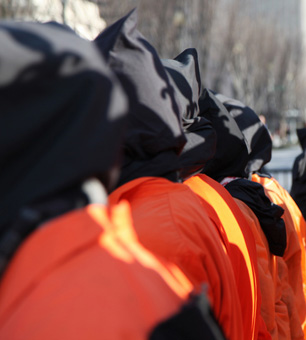Plaintiffs arguing that a provision in the 2012 National Defense Authorization Act (NDAA) allows for military detention of US citizens, squared off with Department of Justice (DOJ) lawyers Wednesday morning in a Manhattan appeals court. The plaintiffs, who include journalist Chris Hedges and six political dissidents, claim their rights have been chilled as a result of the new provision, and that they have reasonable fear of prosecution under what they claim are new domestic military powers.
The DOJ argued that the controversial sections of the NDAA don’t add additional powers to the executive branch: They merely restate those that already exist.
US District Judge Katharine Forrest previously ruled in favor of the plaintiffs, issuing an injunction against the relevant parts of the massive NDAA on First and Fifth Amendment grounds, which the Obama administration appealed.
After the morning’s arguments, the panel of three judges adjourned the court, hinting they may not issue a ruling until after the Supreme Court hears a related case involving warrantless wiretapping – Clapper vs. Amnesty International – in which Hedges is also a plaintiff.
The provision at the heart of the lawsuit is 1021(b)(2), which allows the military to detain people who “substantially supported al-Qaeda, the Taliban or associated forces.” Detainees could be held “without trial until the end of hostilities,” which could mean indefinitely in a so-called war on terrorism that has no end in sight.
“[The NDAA] is designed to detain US citizens,” Hedges said at a press conference immediately following the morning’s arguments. “The corporate state doesn’t trust the police to protect them. They want to be able to call in the military.”
Much of the discussion in court revolved around the relationship between the NDAA and the 2001 Authorization for the Use of Military Force (AUMF). “As the courts have held, the AUMF doesn’t confer detention authority explicitly, and only acts of Congress could confer that authority,” defense attorney Carl Mayer said in an interview. “The NDAA is trying to retroactively baptize detentions that have been taking place since the time of September 11.
“But it also reaches beyond that,” Mayer continued. “It goes to try to detain US citizens and US residents on US soil, which the Supreme Court doesn’t allow and has never allowed.”
Robert Loeb, on behalf of the Department of Justice, argued in court that the plaintiffs haven’t demonstrated a “reasonable, objective, rational” fear of detention. He claimed that independent journalists have nothing to fear from the NDAA and would not be treated as combatants unless there was evidence they were only using journalism as a cover and were in fact members of a designated enemy group.
Defense attorney Bruce Afran found evidence for his clients’ fear of military detention in an unlikely source: primary sponsor of the NDAA bill Lindsey Graham (R-South Carolina). In Senate testimony, Graham stated [emphasis added]:
In this case where somebody is worried about being picked up by a rogue executive branch because they went to the wrong political rally, they don’t have to worry very long, because our federal courts have the right and the obligation to make sure the government proves their case that you are a member of al-Qaeda and didn’t go to a political rally.
Afran argued that Sen. Graham’s statement acknowledges a legitimate fear that somebody could be detained by the military – albeit briefly, in Graham’s wording – simply for attending a political rally, or presumably engaging in other protected First Amendment activity.
Wednesday’s arguments took place in the shadow of the recently leaked DOJ “white paper” that shed light on the Obama administration’s guidelines for when a US citizen can be assassinated without judicial or congressional oversight. The white paper “uses exactly the same language we saw in the NDAA,” Hedges said in an interview, referring to the phrase “associated forces” of al-Qaeda. Reading the white paper, he said, “was kind of chilling.”
The indictment of internet activist Aaron Swartz for mass-downloading scholarly subscription-only articles is one of many examples cited by NDAA critics who say the government targets dissidents and uses every tool at its disposal to punish them. Swartz was facing possibly decades in prison when he committed suicide in January.
Thomas Drake, a plaintiff in the NDAA lawsuit, is a National Security Agency whistleblower who exposed a massive data-mining dragnet that captured billions of transactions made daily by Americans, as well as other programs that engaged in fraud and abuse. After he became the target of a DOJ investigation, his house was raided by the FBI, and he was once asked by a federal prosecutor: “How would you like to spend the rest of your life in prison?”
“I understand how [Aaron] could find himself in a place where he thought there was no way out,” Drake said of Swartz’s suicide. “It’s relentless. When the government targets you, as they have in this era of our history, I can’t begin to tell you in words what it means. The pressures are enormous.”
Join us in defending the truth before it’s too late
The future of independent journalism is uncertain, and the consequences of losing it are too grave to ignore. To ensure Truthout remains safe, strong, and free, we need to raise $43,000 in the next 6 days. Every dollar raised goes directly toward the costs of producing news you can trust.
Please give what you can — because by supporting us with a tax-deductible donation, you’re not just preserving a source of news, you’re helping to safeguard what’s left of our democracy.
